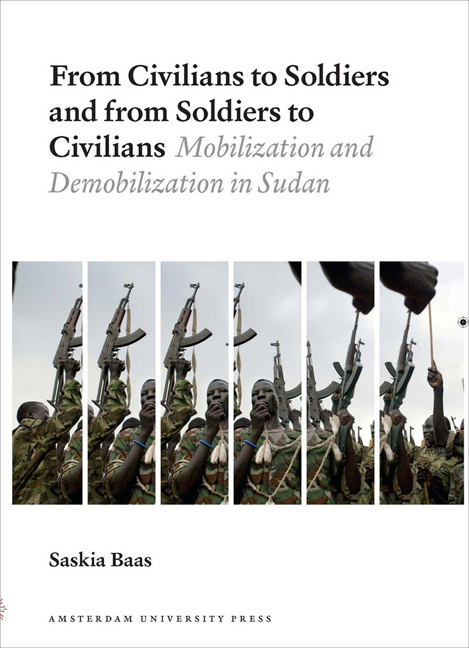Book contents
- Frontmatter
- Dedication
- Contents
- Acknowledgements
- List of Acronyms
- 1 Introduction
- 2 Recruitment
- 3 Becoming a soldier
- 4 At War's End
- 5 DDR Policies and Realities in Sudan
- Concluding Remarks
- Appendix I: Checklist Interviews Former Combatants
- Appendix II: Example of an Interview Report
- Notes
- Bibliography
- Index
- Frontmatter
- Dedication
- Contents
- Acknowledgements
- List of Acronyms
- 1 Introduction
- 2 Recruitment
- 3 Becoming a soldier
- 4 At War's End
- 5 DDR Policies and Realities in Sudan
- Concluding Remarks
- Appendix I: Checklist Interviews Former Combatants
- Appendix II: Example of an Interview Report
- Notes
- Bibliography
- Index
Summary
Towards a comprehensive theory on the motivation of actors in civil war
Since the mid 1990s, social scientists have increasingly engaged themselves in debating the causes and cures of civil wars. Theorists who emphasize the rationality of civil wars by pointing towards the role of natural resources have been criticized for their one-dimensional approach that overlooks the complex interplay of economic, political and social factors during civil wars. These days, the greed-grievance debate seems to be reaching a point of synthesis, as more and more studies are integrating economic factors into more comprehensive analyses of wars. This has brought forth some insightful studies that do justice to the complexity of civil wars.
Yet, although the greed-grievance debate has instigated innovative research into civil wars at the macrolevel, microlevel motivations for rebellion are still under-researched. What has become clear from this study, is that the universalism assumed by both the econometric approach to civil wars and by the ‘New Wars’ perspective, does not hold. Participation in armed rebellion cannot be universally ascribed to greed, as these two theories assume. Likewise, it cannot be universally attributed to grievance or any other motivation. Different people join different armed movements for different reasons. In South Sudan, the insecurities resulting from intense fighting caused large groups to join the SPLA, seeking protection and some form of control over their lives. Forced recruitment created another important source of young fighters, but was inevitably limited to the areas that were under the movement's control. In Eastern Sudan, strong identification with the movement's political goals motivated young men to fight. As Macartan Humphreys and Jeremy Weinstein conclude after analyzing recruitment by armed movements in Sierra Leone:
Given the powerful evidence for multiple paths to participation in Sierra Leone, we believe that the debate now needs to shift from battles over the supremacy of particular theories to a concerted analysis of the conditions under which distinct strategies of recruitment are pursued by different groups at different times.
In my view, such a comparative approach mainly requires more collection of empirical data below the macrolevel, to which this research has aimed to contribute.
- Type
- Chapter
- Information
- From Civilians to Soldiers and from Soldiers to CiviliansMobilization and Demobilization in Sudan, pp. 203 - 206Publisher: Amsterdam University PressPrint publication year: 2012



